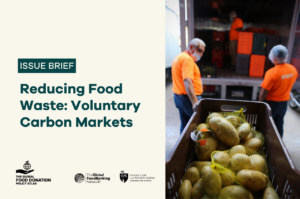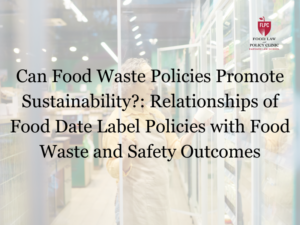Originally written by Emily Broad Leib and published by the LA Times on May 12, 2023.
If on digging through your fridge you find food stamped with a phrase such as “Enjoy by,” “Best before,” “Expires on” or “Sell by” followed by a date that has passed, you might think it’s time to throw it away.
In reality, those dates are mostly arbitrary, largely unregulated and often unrelated to food safety. They’re also responsible for a huge share of the food waste that Californians and other Americans generate every year. That could change under legislation being considered in Sacramento.
It’s not surprising that consumers are confused by the current state of affairs. More than 50 phrases suggesting expiration have been documented on food labels in the United States. Only a few of these printed dates actually mean the food is no longer safe to eat. Others, such as “Sell by” dates, are meant only to help stores decide when to rotate their stock. The U.S. Department of Agriculture notes that most food is safe even after such dates unless “spoilage is evident.”
Given the lack of clarity about what these dates mean, many consumers employ a “when in doubt, throw it out” strategy. An estimated 20% of household food wastecan be attributed to food tossed out because it “expired.” The USDA estimates that more than a third of the American food supply is wasted — more than enough to feed all the country’s hungry and food-insecure — and 43% of this garbage is generated at the household level. This suggests that the average American consumer spends around $1,300 a year on food that is ultimately thrown away.
All of this waste costs us in other ways as well. Food disposed in landfills emits methane as it decomposes. As a greenhouse gas that promotes global warming, methane is 86 times more powerful than carbon dioxide in the short term. Reducing food waste and the resulting methane emissions is therefore most individuals’ single most effective means of fighting climate change.
When we waste food, moreover, we have to buy more. Meeting the consequent demand also generates greenhouse emissions, further exacerbating our climate problems.
Legislation by state Assemblymember Jacqui Irwin (D-Thousand Oaks) would address this by mandating clearer food date labeling. Assembly Bill 660 would require food sold in California to use one of only two types of standardized labels: “BEST if Used by” or “BEST if Used or Frozen by” would indicate that products will decline in quality or freshness past the date on the label; “USE by” or “USE by or Freeze by” would indicate that a product’s safety risks can increase after that date.
These terms already have support from the U.S. Food and Drug Administration, the USDA, the California Department of Food and Agriculture and the food industry.They also match the terms used in bipartisan federal legislation on the subject that has been repeatedly introduced in Congress and was just reintroduced this week.
With federal lawmakers considering but so far failing to act on the issue, efforts to standardize food date labels have been underway for years in California. In 2017, after an earlier unsuccessful attempt to mandate changes, the state Legislature adopted voluntary standards for food labeling. But despite support from industry groups, studies show that store shelves and consumer refrigerators are still filled with food bearing labels that are inconsistent with the standards.
Other countries have dealt with the problem. An analysis of international date labeling laws by Harvard Law School’s Food Law and Policy Clinic showed that the U.S., where federal date labeling requirements are limited to baby formula, is an outlier. The European Union, with a market of 450 million consumers, requires all packaged food products to have one of two standard date labels: “best before,” for use as a quality indicator, or “use by,” for food that may pose increased safety risks past the indicated date.
AB 660 is a similarly simple, commonsense, research-based solution to a pervasive problem in California. Consumers should not bear the burden of discerning the difference between labels such as “Enjoy by” and “Expires on.” Mandating the use of uniform date labels is the best way to ensure customers keep food out of landfills and keep money in their pockets.
Emily Broad Leib is a clinical professor of law at Harvard Law School, the founding director of the school’s Food Law and Policy Clinic and the faculty director of its Center for Health Law and Policy Innovation.


Health Law & Policy, Commentary
Freezing the Freeze: An Update on Litigation Challenging Trump’s Funding Freeze – HCIM
March 27, 2025